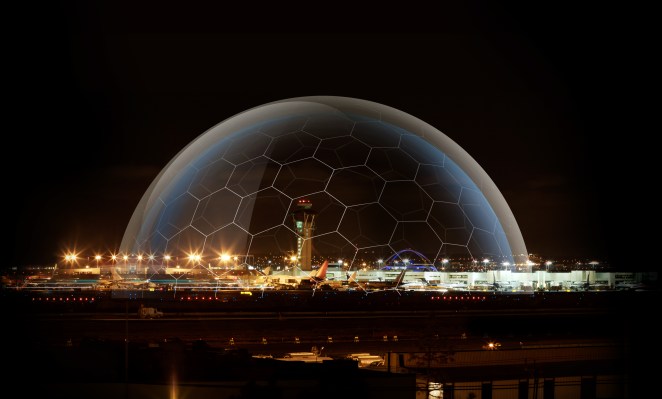For better or worse, drones are about to become a lot more prevalent in US airspace. The FAA expects sales of drones to spike domestically from 2.5 million last year to 7 million by 2020. Now, a startup that detects drones and helps prevent unwanted aerial intrusions, Dedrone, has closed a $15 million Series B round of venture funding.
Investors in San Francisco-based Dedrone included Cisco Executive Chairman John Chambers, and Felicis Ventures, which led the round. The founder and Managing Director of Felicis Ventures, Aydin Senkut, said the deal represents the largest check his firm has cut in a single round to-date.
Dedrone works with physical security companies to set up sensors, cameras and RF scanners on the ground and on rooftops at a given venue. Its technology has been used to monitor the skies over data centers, sports stadiums and the homes of high net-worth individuals and political figures. The company’s drone security product has only been available on the market for one year, but the company recently surpassed 200 installations, according to CEO Jorg Lamprecht.
The CEO said he loves the positive promise of unmanned aerial systems, which can produce beautiful aerial photography, enable hyper-convenient deliveries, and all frequent inspections of tall structures without putting workers on shaky scaffolding. But he also noted drones carry the risk of aerial espionage, contraband or drug smuggling across borders, and amateur accidents.
Dedrone can set up around cities where major events are scheduled, so the company often works with federal and city governments to monitor airspace. Its technology was used to detect drones, for example, over Davos, and two presidential debates.
According to Lamprecht, Dedrone will use its funding, primarily, to bring its existing technology to more businesses and government offices, with a special focus on companies operating data centers. Additionally, he said Dedrone will continue research and development in drone security.
Why the early uptake and continued focus on data centers? The CEO explained, “The data center is so vulnerable. Most have a rooftop installation with cooling elements. If a drone crashses into this, you can break down a whole data center in seconds. That’s with a $500 commercial drone flown by an amateur, or in a deliberate attack. They have had guards with machine guns on the ground, but now they need to watch the skies.”
Felicis’ Aydin Senkut tells TechCrunch his firm backed Dedrone because of its ability not just to spot drones in the sky, but precisely locate a drone’s operator on the ground, enabling a wide range of so-called “counter measures” to deal with unwanted drones. Senkut said, “Everyone says if a drone flies where you don’t want it to be, why not just take it down? Many are small and light but can still cause a lot of damage if you shot it out of the sky. It can be a safer option to communicate with the pilot first, depending on the situation.”
He also said Dedrone was an appealing investment because its technology remains useful no matter how regulations around drones or counter-drone measures may shift. It’s not clear that any business will be permitted to use lasers, nets, jammers or other systems to take down drones in their airspace. But, Senkut said, “To do anything with drones, or about the drones that you don’t want around, you need to just be able to accurately identify them first.”
